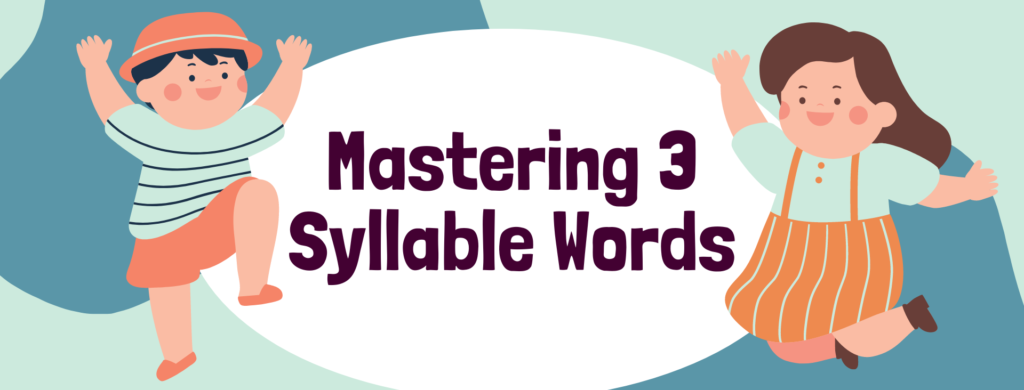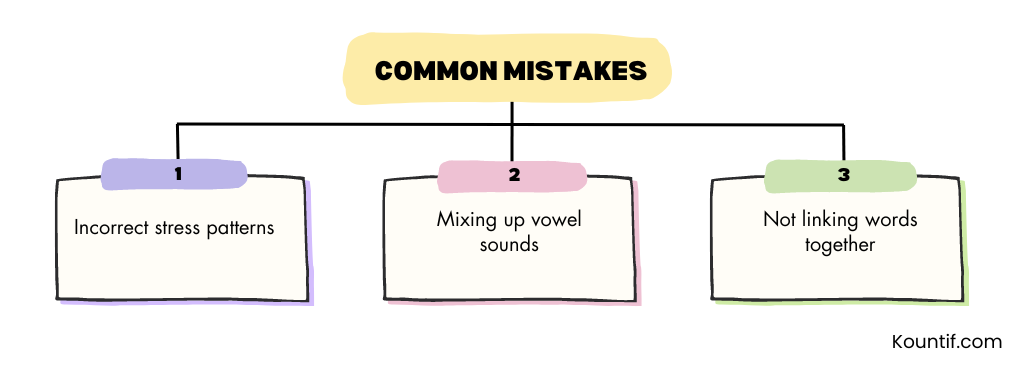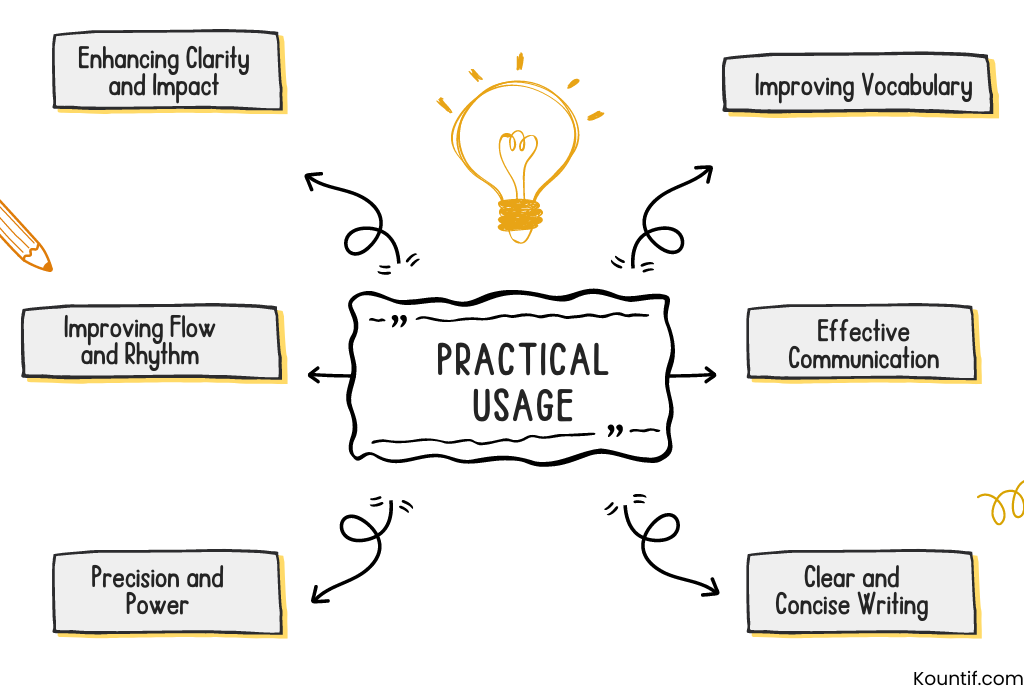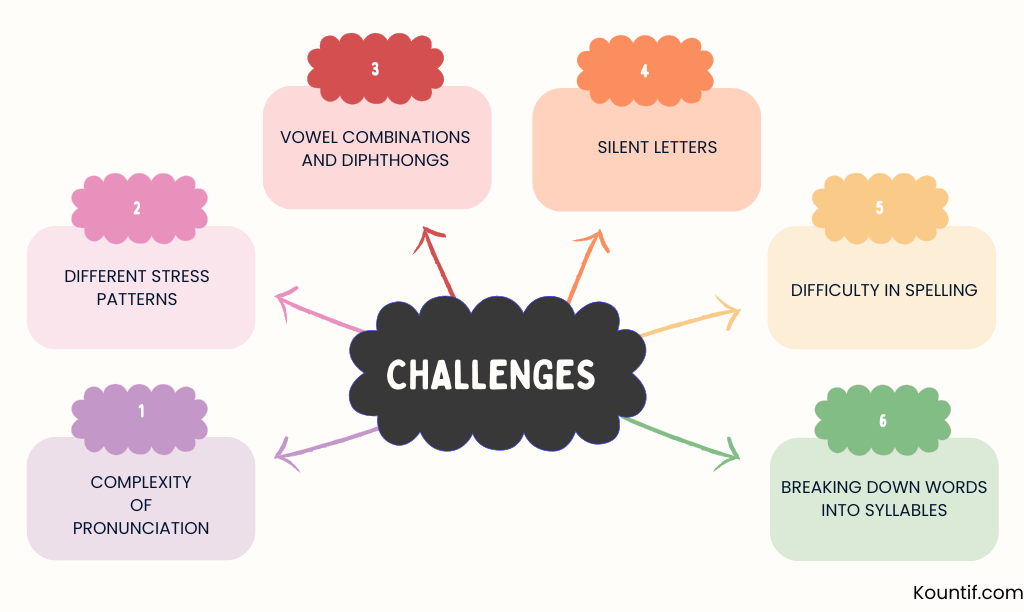
“Welcome to the world of three syllable words, where language meets rhythm and precision! Also known as 3 syllable words or triple-syllable words, these linguistic gems are the building blocks of effective communication. Whether you’re looking to enhance your vocabulary, improve your pronunciation, or simply expand your linguistic repertoire, our list of 3 syllable words is the perfect starting point. So, dive into the world of 3 syllable words and discover the power of triple-syllable words to elevate your language skills and take your communication to the next level!”
In this guide, we will delve into the world of 3 syllable words and provide tips and tricks for effectively learning and using them in your everyday conversations. Whether you are a beginner or an advanced learner, this guide is designed to help you expand your vocabulary and take your language skills to the next level.
Table of Contents
Toggle3 Syllable Words Breakdown
| Word | Syllable Breakdown | Explanation |
|---|---|---|
| Computer | com-pu-ter | Device central to daily life |
| Banana | ba-na-na | Popular and nutritious fruit |
| Telephone | tel-e-phone | Crucial invention for communication |
| Restaurant | res-tau-rant | Establishment offering meals and drinks |
Phonetics and Pronunciation of 3 Syllable Words
Pronunciation can be tricky in language learning, especially for words with multiple syllables. This section will focus on the phonetics and pronunciation of 3-syllable words.
3 Syllable Word Pronunciation (Say it Right)
Learning to pronounce words with three syllables might help you communicate more effectively and seem more natural when you talk. The following tips will help you pronounce these words correctly.
Break the word down into syllables:
Finding the syllables of a three-syllable word is the first step toward accurately pronouncing it. This is important because, to pronounce a word correctly, you must recognize the unique vowel sounds that each syllable produces.
Pay attention to vowel sounds:
Vowels are essential for speech because they are the building blocks of language communication. Their sounds change significantly depending on the word’s meaning and where it is in a sentence. Knowing and using the correct vowel sound for each phrase is essential when speaking three-syllable words. Mastering these sounds can make it easier to learn new words and improve your speaking skills.
Practice linking words together:
People who speak English often connect words when they talk, which makes the speech move smoothly. Because of this linking, there isn’t always a clear break between words, so the speech sounds smooth and continuous. This quality of spoken English can make it hard for English learners to differentiate words, so practice linking words in your conversation.
Stress Patterns (Where to Put the Emphasis)
As mentioned earlier, stress patterns are crucial in pronouncing 3-syllable words. Here are some common stress patterns to keep in mind:
First syllable stress:
This pattern is predominantly observed in 3-syllable words, where the emphasis is strategically placed on the first syllable to dictate pronunciation and rhythm. This stress pattern is crucial for proper articulation and understanding in spoken language.
An example of first-syllable stress can be seen in the word “Happy,” where the initial syllable “Hap” is accentuated, forming the backbone of this linguistic structure.
Second syllable stress:
In this pattern, the emphasis is placed on the second syllable of a 3-syllable word. This stress pattern is commonly used in words that end with “-ic” or “-ion.” An example of second-syllable stress can be seen in the phrase “Elastic,” where the middle syllable “las” receives more weight and attention.
Third syllable stress:
As the name suggests, emphasis is placed on the third syllable of a word in this stress pattern.
A typical example is words like “Unnecessary,” where the third syllable ‘-ry’ carries more weight and impact when spoken.
Common Mistakes in 3 Syllable Word Pronunciation
Here are some common mistakes that non-native speakers make when pronouncing 3-syllable words:
Incorrect stress patterns:
This is a mistake that many English beginners make, mainly because English has hard stress rhythms. It’s essential to pay close attention to how native speakers say words and copy how they stress words. This can help you pronounce words better and sound more natural when you speak English. Remember that practicing regularly and listening actively is the only way to get through this.
Mixing up vowel sounds:
In English, vowel sounds are tricky because they change based on the word and its meaning. Because of this, it’s easy to mix up sounds and say words wrong. Please pay close attention to the vowel sounds in three-syllable words and practice saying them correctly.
Not linking words together:
People who aren’t native speakers often pause between words, which makes their speech sound unstable. This is a common problem that can be fixed with practice. Smooth word linking is essential for a natural flow and to sound more like a native speaker. This includes the words you use and the pace and tone of your voice, which makes the language flow better.
Practical Usage of 3 Syllable Words
For conversation to work, you need to use a range of words. One way to make your writing and speech more interesting is to use words with three syllables. But it is essential to use these words smartly and correctly.
Enhancing Clarity and Impact
Using many different words can help your writing be more precise and powerful. Three-syllable words can help you convey your point more clearly because they usually mean more specific things. These words can also give your work more depth and subtlety, making it more attractive to read.
Example: Instead of saying “bad,” you could use the word “deplorable” to convey a stronger and clearer message.
Improving Vocabulary
Using 3 syllable words can enhance your vocabulary and make it more dynamic. This will make your speech more diverse and help you better express yourself in different situations. Learning new words and their pronunciations can be a fun and enriching experience that improves your overall language skills.
Example: Instead of “happy,” you could use the word “ecstatic” to convey a more specific and nuanced emotion.
Improving Flow and Rhythm
Adding three syllable words to your work can also help it move better. Most of the time, these words sound more rhythmic, which makes it more exciting and pleasant to hear. Using these words in your sentences can also help change the length and structure of your sentences, making your work more interesting.
Example: Instead of using multiple short sentences, you could incorporate a longer sentence with three-syllable words to add variation and improve flow.
Effective Communication
Choosing the right words is crucial for effective communication. Three-syllable words can help you convey your message more precisely and with a more significant impact. They also add sophistication and depth to your writing, making it more engaging for readers.
Example: Instead of saying “important,” you could use the word “significant” to emphasize the importance of a specific topic or idea.
Precision and Power
In addition, using words with three syllables can make your work more transparent and more robust. These words’ strong meanings will make your job more believable and persuasive. However, using these words in the right situation is essential so they don’t sound fake or unnatural.
Example: Instead of saying “small,” you could use the word “minuscule” to convey a stronger and more precise image.
Clear and Concise Writing
Adding words with 3 syllables to your writing can also make it easier to understand. These words usually mean more specific things, so you can say what you want with fewer words. This is especially helpful when writing for work or school.
Example: Instead of saying “difficult,” you could use “arduous” to convey the same meaning more concisely.
Challenges in Learning 3 Syllable Words
Learning words with 3 syllables can be challenging for both kids and adults. They are often more complicated and hard to remember and say correctly. This section will discuss some of the most common problems students have when they try to learn three-syllable words.
Complexity of pronunciation
Learning and remembering three-syllable words can be challenging because they sound complicated. When trying to say these things, people who aren’t native speakers may have trouble with the correct stress patterns, vowel sounds, and word connections. You have to work at saying these words over and over again.
Different stress patterns
Understanding that three-syllable words can have different stress patterns is a big part of its difficulty. Three-syllable words can have different stress levels on each syllable, while one—or two-syllable words usually have a clear stress pattern. It’s hard for students to figure out which sounds to stress when saying the word this way.
Vowel combinations and diphthongs
Another challenge in learning 3-syllable words is the combination of vowels and diphthongs (two vowel sounds combined into one syllable). These combinations may not exist in a student’s native language and, therefore, can be difficult to pronounce correctly. Practice is key to mastering these challenging sound combinations.
Silent letters
The appearance of silent letters is another thing that makes learning 3 syllable words hard. In one- or two-syllable words, all the letters are usually pronounced. However, in three-syllable words, quiet letters can change how the word is pronounced in a big way. To do this, students must learn by heart which letters should be pronounced and which should be left alone.
Difficulty in spelling
Not only is pronouncing three-syllable words hard, but they can also be hard to spell. There are more chances to misspell or get confused with words that sound the same when the words are more extended. Silent letters and complicated vowel pairs can also make it hard to figure out how to spell a word correctly.
Breaking down words into syllables
Some students find it hard to break words down into their sounds. This is especially true if the word mixes vowels and sounds they don’t usually hear together in their language. You need to practice and learn new things to get better at this.
Strategies and Tips for Mastering 3 Syllable Words
Several strategies and tips may simplify the process of mastering 3-syllable words. These methods enhance people’s general communication abilities, pronunciation, and vocabulary.
Break Down the Word:
Breaking the word into its essential syllables and focusing on each separately can help you divide it appropriately. Pronunciation and comprehension of word structures can be improved with this approach. To illustrate, “computer” can be broken down into three syllables, as in “com-pu-ter”. Complex words become easier to pronounce and understand because of this breakdown, which enables a concentrated approach to each component.
Use Flashcards:
Making flashcards with the term and its description on one side and a relevant image on the other can help you learn more effectively. This visual help greatly enhances your ability to retain information. To improve the effectiveness of the activity, try quizzing yourself by covering the answer side of the flashcard and trying to remember the definition of the term or the idea that the image represents. Studying becomes more dynamic and exciting when you use this technique, which also helps to strengthen your memory.
Practice, Practice, Practice:
It often helps to repeat a new word to become comfortable with pronunciation and rhythm. This practice enables you to remember the word’s pronunciation and tone. Try using the term in other sentences or brief phrases instead of repeating it. This exercise helps you use the term more effectively by strengthening its pronunciation and enabling you to use it in more contexts.
Learn Word Families:
Similar prefixes, suffixes, or roots—the fundamental components that give the word its structure—are often found in three-syllable words. By familiarizing yourself with particular word families, you may significantly enhance your capacity for understanding and decoding unfamiliar words. This information may help you expand your vocabulary, improve your reading comprehension, and overall improve your language skills.
Listen and Imitate:
Engage in active listening to audio recordings or native speakers pronouncing the word to enhance your pronunciation and tone. Please take note of the details of their delivery, such as their rhythm and tone, and then try to replicate them as much as you can. Your ability to pronounce words correctly will improve significantly with practice, leading to more fluid and natural speaking. Additionally, you may improve your general language abilities and communicate more effectively by repeating this practice with other words and phrases.
Speaking Naturally:
By reading loudly, recording, listening to native speakers, and using internet pronunciation tools, you may enhance your ability to pronounce 3-syllable words. Errors in pronunciation may be found and fixed using these techniques.
Learn also 2 syllable words.
Comprehensive 3 syllable words list
An extensive 3 word syllables list organized alphabetically and by theme provides a valuable reference for learners. This list serves as a tool for expanding vocabulary and exploring the richness of the English language.
3 Syllables Words
| Letter | Words |
|---|---|
| A | Adventure, Alligator, Ambulance, Ammunition, Anatomy, Absorbent, Advocate, Adversary, Adversity, Aromatherapy |
| B | Beautiful, Butterfly, Basketball, Blueberry, Breakfast, Building, Bankruptcy, Babysitter, Balloon, Beneficial |
| C | Chocolate, Caterpillar, Celebration, Character, Cinnamon, Consequence, Conference, Candidate, Condition, Cathedral |
| D | Dictionary, Detective, Direction, Dangerous, Development, Declaration, Democracy, Depreciate, Distribution, Disagreeable |
| E | Elephant, Emergency, Education, Examination, Elevator, Environment, Essential, Entertainment, Electricity, Executive |
| F | Firefighter, Furniture, Festival, Formation, Fascinating, Fulfillment, Frequency, Forgiveness, Financial, Fluctuation |
| G | Generation, Geography, Giraffe, Government, Gratitude, Gallery, Guarantee, Graduation, Geography, Gymnastics |
| H | Hurricane, Helicopter, Hospitality, Hologram, Hamburger, Harmony, Headquarters, Hemisphere, Handicapped, Hypothesis |
| I | Invention, Investigation, Intention, Innocence, Interpretation, Infection, Inspiration, Irrigation, Inequality, Interaction |
| J | Jellyfish, Jamboree, Journalism, Jurisdiction, Justification, Junction, Juxtaposition, Judicious, Juvenile, Japanese |
| K | Kaleidoscope, Kangaroo, Karaoke, Kilometer, Kindergarten, Ketchup, Knowledge, Kingdom, Keynote, Kiteboard |
| L | Laboratory, Lighthouse, Landscape, Legislation, Locomotive, Literacy, Lullaby, Liberation, Lifestyle, Longevity |
| M | Magnificent, Microphone, Motorcycle, Meteorology, Meditation, Multimedia, Millionaire, Mysterious, Masquerade, Monopoly |
| N | Necessity, Negotiation, Nourishment, Notification, Neurology, Narrative, Nostalgia, Nationwide, Noteworthy, Novelist |
| O | Opportunity, Orchestra, Organization, Orientation, Obligation, Observation, Opportunity, Offensive, Overseas, Occurrence |
| P | Photographer, Parachute, Pomegranate, Penitentiary, Perfection, Probability, Population, Pollution, Prescription, Prestigious |
| Q | Qualification, Quadrilateral, Quarantine, Quantitative, Quicksilver, Questionnaire, Quotient, Quintessential, Quotidian, Qualified |
| R | Restaurant, Reflection, Relationship, Revolution, Refrigerator, Recitation, Resurrection, Representation, Renewable, Radiator |
| S | Symphony, Supermarket, Satisfaction, Sensation, Serenade, Signature, Stimulation, Submarine, Surrender, Scholarship |
| T | Telephone, Television, Technology, Transaction, Transportation, Temperature, Territory, Trampoline, Thunderstorm, Tornado |
| U | University, Umbrella, Understand, Universal, Unpredictable, Unbelievable, Unstoppable, Unprecedented, Unnecessary, Unfortunate |
| V | Vegetable, Validation, Voluntary, Vocabulary, Vegetarian, Variation, Vibrant, Visionary, Vulnerable, Violation |
| W | Watermelon, Wilderness, Whirlwind, Waterfall, Wholesome, Weatherman, Wanderlust, Wonderland, Wavelength, Waterfront |
| X | Xylophone, Xenophobia, Xerography, Xylography, Xylitol, Xenon, Xylene, Xanthan, Xylenol, Xylograph |
| Y | Yesterday, Yellowtail, Youthful, Yearning, Yearbook, Yearning, Yielding, Yardstick, Yearly, Yesteryear |
| Z | Zucchini, Zephyr, Zeppelin, Zirconium, Zigzag, Zenith, Zeroes, Zoology, Zombie, Zebra |
Advantages of Using 3-Syllable Words in Language Learning
Gaining proficiency in 3-syllable words benefits more than simply vocabulary growth. It improves fluency, pronunciation, and an understanding of language nuances. This enhances language ability overall and improves one’s understanding of culture.
Improved Vocabulary:
Learning three-syllable words significantly increases your vocabulary and improves your capacity to express complex ideas and thoughts more clearly. This knowledge enhances your ability to communicate and your language comprehension, allowing you to have more complex conversations and communicate more nuancedly.
Enhanced Pronunciation:
Learning to pronounce words with three syllables significantly improves your language abilities by encouraging a more natural flow and rhythm in your voice. This not only increases the fluency and confidence in your voice but also enhances your communication skills, making it simpler for others to understand you. As you grow more acquainted with the subtleties of language intonation, it also helps with improved listening comprehension.
Better Understanding of Word Structure:
It is helpful to comprehend how words are formed and analyzed when three-syllable words often follow specific patterns and principles. These learning patterns improve linguistic awareness and simplify the learning process, providing a better understanding of word structure and pronunciation. Learning these patterns may improve the ability to identify and use three-syllable words efficiently.
Increased Confidence:
Using 3-syllable terms in your vocabulary can boost your speaking confidence significantly. Using this language technique can help you express your ideas and thoughts more clearly and concisely, leading to more robust and understandable conversations in both personal and professional contexts.
More Precise Expression:
Three-syllable words may communicate ideas more precisely since they have a more profound and broader range of meanings. This makes it easier for you to speak with precision and detail, enhancing your talks’ effectiveness and interest. Your ability to communicate clearly and effectively increases with your vocabulary, improving your language proficiency overall.
Enhanced Creativity:
Improving expertise with 3-syllable words greatly expands your vocabulary and gives you additional language skills to convey your ideas, feelings, and thoughts in written and spoken communication more creatively and effectively. With better language skills, you may communicate more effectively and thoroughly engage your audience, making your literary works and discussions more captivating and unforgettable.
Try also our syllable counter.
Quick Overview
| Section | Topic | Key Points |
|---|---|---|
| Introduction | Mastering 3-Syllable Words | Importance in language learning |
| Examples | 3-Syllable Word Examples | Computer, Banana, Telephone, Restaurant |
| Phonetics and Pronunciation | 3-Syllable Word Pronunciation | Break down words, pay attention to vowel sounds, practice linking words |
| Stress Patterns | Where to Put the Emphasis | First syllable stress, second syllable stress, third syllable stress |
| Common Mistakes | Errors to Avoid | Incorrect stress patterns, mixing up vowel sounds, not linking words together |
| Effective Usage | Using 3-Syllable Words Effectively | Enhance clarity and impact, improve vocabulary, improve flow and rhythm |
| Challenges | Overcoming Difficulties | Complexity of pronunciation, different stress patterns, vowel combinations, silent letters |
| Strategies and Tips | Mastering 3-Syllable Words | Break down words, use flashcards, practice pronunciation, learn word families, listen and imitate |
Conclusion
Learning 3-syllable words is essential to language growth because they help with conversation, grammar, and sound. Learners can improve their speed and trust with three-syllable words by understanding their stress patterns, vowel pairs, and silent letters. To help students remember 3-syllable words, this piece suggests breaking words down into syllables, using notes, practicing speech, and learning about word groups. Using three-syllable words helps you be more creative, understand others, and develop new ideas. Using three-syllable words when learning a language helps students understand more than just new words. It helps them know cultural and verbal nuances. Accepting words with three syllables may help learners improve their personal and business interactions.
FAQ
Q: What are 3 syllable words?
A: 3-syllable words have three distinct syllables, such as “computer” or “banana”.
Q: Why are three syllable words important in language learning?
A: Mastering 3-syllable words can enhance vocabulary, pronunciation, and overall communication skills, leading to more effective and precise expression.
Q: What are some common challenges in learning three syllable words?
A: Challenges include complexities in pronunciation, stress patterns, vowel combinations, and silent letters, as well as difficulty in spelling and breaking down words into syllables.
Q: How can I improve my skills in using 3-syllable words?
A: Strategies include breaking down words into syllables, using flashcards, practicing pronunciation, learning word families, and listening to native speakers.
Q: What are some benefits of incorporating 3 syllable words into my language repertoire?
A: Benefits include improved vocabulary, pronunciation, and comprehension, enhanced creativity, and more precise and effective expression.
Q: How can I practice using 3 syllable words in context?
A: Try using 3-syllable words in sentences, short phrases, and conversations, and listen to native speakers to improve your pronunciation and intonation.
Q: Are resources available to help me learn and practice 3-syllable words?
A: Yes, many online resources, language learning apps, and language exchange programs can provide support and practice opportunities.









